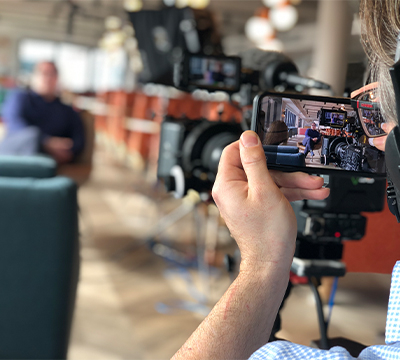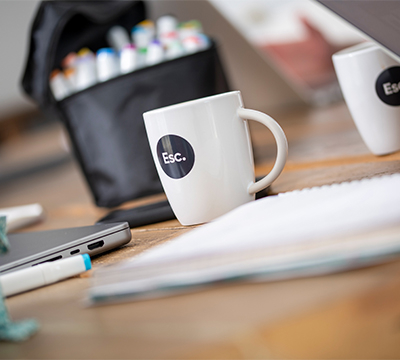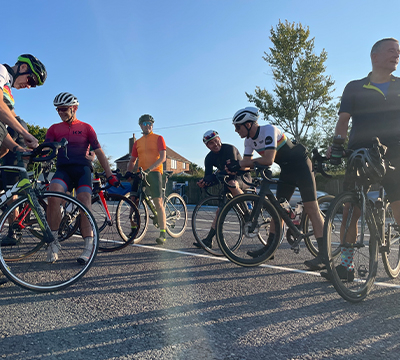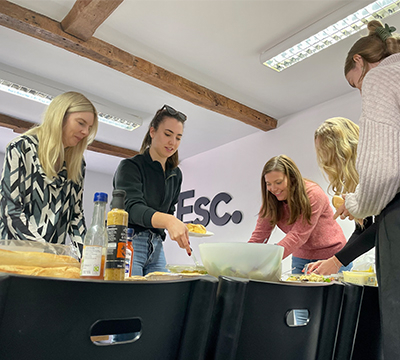
INSIGHTS A day in the life of a...Front End Developer

Welcome to our 'A day in the life of a...' series.
This is where you'll be getting to know our talented Escapees (we're talking strictly professional here!), as well as having a sneaky peek behind the curtains of agency life.
So meet Tom Hopkins, our super talented Senior Front End Developer...
Hello there, I am Tom, the Senior Front End Developer at The Escape. You could probably sum up my role by saying ‘I take the design and make the stuff you see, use and interact with on the web’, although this summation barely encompasses all the responsibilities of a frontend developer!
From the beginning of a project and all the way through to the end, I am constantly communicating and collaborating with the other members of the project team. I collaborate a lot with the UX and UI design team, knowing what is possible and what new things we can try and then build the static versions of the design. We always make sure we’re in constant communication so I know I’m going in the right direction, based on their design and the client’s brief. It’s vital too to keep in mind how the back end developers will want to take my work and add it into the CMS of choice, so we discuss components and how they work and function regularly. Some people think of developing as a lonely job, but for me, at least with the way I play my role, it’s not at all.
So a typical day for me can look like this:
Morning
If you have read the other ‘Days in the life of...’ features, you will know we all start with a board meeting at 9am. This gives us all a nice chance to see everyone’s faces and have a quick chit chat before going through the work we will be doing for the day. It gives us the opportunity to bring up any project issues and queries we might have and then to go off to chat about them after the board meeting.
After the meeting I usually try to spend some time going through a series of newsletters I subscribe to. The front end development world is a fast moving industry with new and different ways of building websites coming out almost daily. The newsletters are a curated list of articles from prominent people in the industry showing off new and interesting tech and news. Trying to keep up with everything is hard work, so I just like to keep my thumb on the pulse of the front end industry. I quite often learn of some upcoming new feature I can use in a browser but won’t be able to use or implement it for months, but being aware of its existence allows you to reach for it when problem solving for a new project further down the line.
After this my morning can vary from day to day, right now I am currently in the throes of building a new website for the company DX Delivery. So I generally open up my to-do list and work through all the planned out blocks of content - this can involve me quietly tapping away on the keyboard or having a call with another developer or designer about the project. I like to keep my door open for people to ask me questions at any time - it’s very useful to keep the project moving, plus I also enjoy helping people out.

Share insight
Lunch
Lunch for me has changed quite a bit now we are working from home. I used to be down at the local supermarket buying a punnet of blueberries and a Kombucha, or off to a local restaurant like Wagamama or a naughty KFC. So until we return to the office, I’m now at home munching my way through a large punnet of blueberries and brewing my own Kombucha. The sacrifices we have to make... But I also try to spend some time talking to family and getting away from the screen.
Afternoon
Right after lunch I generally have a chat or meeting scheduled to run through some discussion points. This is generally catching up with designers to go through some new design they are working on, critiquing a piece of my work, or talking with a back end developer on any issues they are facing.
Afterwards I'm back to creating some interesting animation or correcting the layout and spacing of a component block type. I will then send it off to a designer to look at or link it to the back end team to build into the CMS, documenting all the interesting features and challenges they might face tackling this new component.
The end of the day is spent going through any admin work I need to do, like recording timesheets, updating project managers and updating Trello boards with the current progress of work and making sure it’s all ready for other members of the team to look at and use.
Bonus round
What do you love about your job?
I really enjoy all the communication and collaboration we do on a project, putting our heads together to push ourselves forward as a company and as individuals is a lot of fun. So working from home has been a bit difficult to adjust to as it’s not as easy to let this happen naturally, not being able to see from the corner of your eye a lapse of concentration and being ready to dive in with a question! We message or video call each other whenever we want to ask a question, which has been working well, though I do miss the more casual chatter that an office environment brings.
What qualifications do you need to succeed as a developer?
Front end web development is great as it has a very low barrier to entry, you don’t need any fancy qualification or training to get started. There are a ton of great resources online for someone wanting to learn. Like the official World Wide Web Consortium, the group behind writing the official specification for the web, have a number of great sites, and MDN which is a site by Mozilla (the guys behind Firefox) which contains the best documentation for front end web developers, which I use daily.
Your one piece of advice?
You probably won’t need to go far online to find an article about framework fatigue or how there is so much to learn that it’s impossible to keep up.
My advice is don’t try to keep up with all the latest trends and learn everything, there is far too much to know and you will not need all of it! Being worried you might not be able to get your next job because you don’t know X framework or X thing can be very tiring and stressful. I try to keep aware of trends, more deeply in areas that I’m interested in, and have a good enough base knowledge of the fundamentals.
The fundamentals being how Javascript works, how CSS works and any other base languages you need to work with. Having this base knowledge allows you to more quickly and easily pick up X framework or X thing. And finally if you don’t know X framework, that’s ok, as long as you are capable of quickly picking things up and learning, this is much more important than actually knowing everything in the first place.
If this sounds like your kind of job, keep an eye on our Careers page for vacancies opening up.
Let's talk
- Call us +44 (0) 1256 334567
If you would like to find out more about how we can help you connect strategically, creatively or digitally, then call us or get in touch. We’d love to hear from you.


















